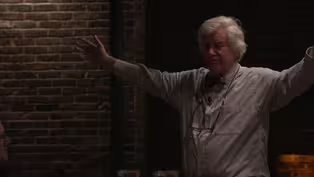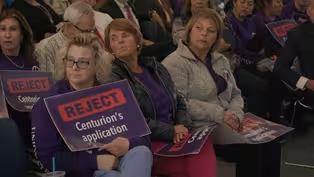
Weekly Insight
Clip: Season 5 Episode 22 | 3m 50sVideo has Closed Captions
Ted Nesi describes the growing healthcare challenges in Rhode Island.
Rhode Island Speaker of the House Joe Shekarchi recently held a high-level healthcare summit at the State House. WPRI 12’s Politics Editor Ted Nesi and Rhode Island PBS Weekly’s Michelle San Miguel discuss challenges facing the state’s healthcare system. They also talk about Governor Dan McKee’s nominee to be the next director of the Rhode Island Department of Health.
Problems playing video? | Closed Captioning Feedback
Problems playing video? | Closed Captioning Feedback
Rhode Island PBS Weekly is a local public television program presented by Ocean State Media

Weekly Insight
Clip: Season 5 Episode 22 | 3m 50sVideo has Closed Captions
Rhode Island Speaker of the House Joe Shekarchi recently held a high-level healthcare summit at the State House. WPRI 12’s Politics Editor Ted Nesi and Rhode Island PBS Weekly’s Michelle San Miguel discuss challenges facing the state’s healthcare system. They also talk about Governor Dan McKee’s nominee to be the next director of the Rhode Island Department of Health.
Problems playing video? | Closed Captioning Feedback
How to Watch Rhode Island PBS Weekly
Rhode Island PBS Weekly is available to stream on pbs.org and the free PBS App, available on iPhone, Apple TV, Android TV, Android smartphones, Amazon Fire TV, Amazon Fire Tablet, Roku, Samsung Smart TV, and Vizio.
Providing Support for PBS.org
Learn Moreabout PBS online sponsorship- Ted, welcome back.
Always good to see you.
We just saw Ian Donnis' story about the proposed sale of both Roger Williams Medical Center and our Lady of Fatima Hospital.
The owner, Prospect Medical Holdings, is looking to sell.
And really, when you take a step back, prospect situation is part of a broader set of challenges we're seeing as it pertains to healthcare in Rhode Island.
- Yeah, obviously, Michelle, as people saw in Ian's report, there are unique problems at Roger Williams and Fatima related to the private equity ownership and all the spillover effects from that.
But all Rhode Island hospitals are challenged by some of the same forces, relatively low reimbursement rates, the patient mix and all of that.
And just not having enough revenue.
And so that's something that would be true, regardless of who owns those two hospitals.
- And healthcare has always been top of mind for, you know, politicians, but this year, it seems even more so.
Recently, House Speaker Joe Shekarchi, held this high level healthcare summit where he invited policymakers, healthcare providers.
One of the speakers was US Senator Sheldon Whitehouse.
Let's take a listen to some of what he had to say.
- I remember when all the major bank headquarters left our state.
The economic ecosystem that those bank headquarters supported fell apart, as the jobs and the professional support moved to where the new headquarters were.
Downtown hollowed out, downtown Providence still has not recovered.
And a lot of civic leadership in Rhode Island was lost.
There was a lot of pain, and I don't wanna see that replicated with our hospitals.
We have to make sure that local control prevails.
- So you hear Senator Whitehouse making an explicit economic argument about why it's so important to stabilize these hospitals.
- Yeah, and I think it goes to, Michelle, why the entire healthcare discussion, and particularly the hospital aspect of it, it touches on so many different issues, right?
First and foremost, it's, of course, a care issue.
Can people find providers?
Can they get specialists if they need them?
Can they afford those providers?
Do the Rhode Island hospitals have the suite of services people want, or do they need to go to Boston?
There's all that around care.
Then it's a economic issue, as Whitehouse said.
You know, they're a source of jobs, the hospitals.
They're a source of research, the hope is always they'll lead to big, you know, spinoff companies, the next Pfizer or something like that.
And then part of that is it's a budget issue, right?
The hospitals have said repeatedly, and you heard it at the summit, that they're not making enough money, their rates are too low.
They're looking to the state government to increase how much Medicaid pays them.
But that gets very expensive, very fast.
And I think that's part of why, you know, it's easy to tick off the challenges here, but it's much harder to find solutions.
- And this comes as the state's Department of Health finally has a new permanent leader.
Let's keep in mind, Dr. Nicole Alexander-Scott, who was the last permanent leader, left more than two years ago.
Governor Dan McKee recently nominated Dr. Jerome Larkin to lead the agency.
So the timing is interesting when you factor in everything else that you're talking about.
- Yeah, and it's gonna be very interesting to see how Dr. Larkin kind of defines his role, where he makes his voice heard.
You know, the health department director has a lot of different responsibilities, from tracking immunizations, making sure that sort of thing is happening.
To licensing and regulation, you know?
Disciplining if a physician does something wrong, regulatory reviews of the hospitals and all that.
But then also the health director is a very important voice in these discussions, like we've been talking about, around the future of the hospitals, around the primary care shortage.
And so, you know, the governor certainly, I would expect lawmakers as well, will be looking at Dr. Larkin for kind of, what do you think we should do here?
Trying to talk to everybody involved and see where he thinks things should be going.
So it's kind of up to him how big a role he wants to take in all of this.
- Thanks so much, Ted.
I appreciate it.
- Good to be here.
Video has Closed Captions
Clip: S5 Ep22 | 8m 32s | Did a daring raid in Warwick spark the American Revolution? One man files suit to prove it. (8m 32s)
Video has Closed Captions
Clip: S5 Ep22 | 12m 9s | Why the uncertainty facing two Rhode Island hospitals is a statewide concern. (12m 9s)
Providing Support for PBS.org
Learn Moreabout PBS online sponsorship
- News and Public Affairs

Top journalists deliver compelling original analysis of the hour's headlines.

- News and Public Affairs

FRONTLINE is investigative journalism that questions, explains and changes our world.












Support for PBS provided by:
Rhode Island PBS Weekly is a local public television program presented by Ocean State Media

